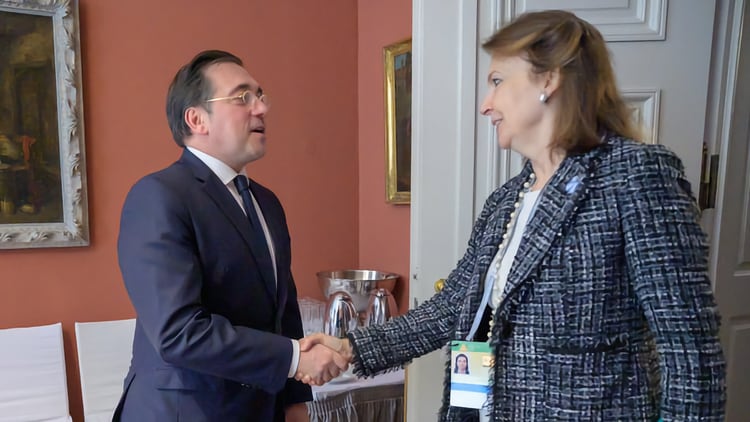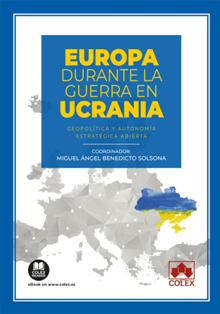Luis Ayllón
The Minister of Foreign Affairs, José Manuel Albares, raised the need for legal security for Spanish investments in Argentina with his Argentinean counterpart, Diana Mondino, during a meeting they held yesterday in Munich in the margins of the Security Conference, according to diplomatic sources consulted by The Diplomat.
Albares and the Argentine president’s foreign minister, Javier Milei, had already had the opportunity to talk briefly during the Davos World Forum, and the possibility of the minister travelling to Buenos Aires at the end of this month was even raised, but, finally, yesterday’s meeting seems to rule out this possibility for the time being.
Bilateral relations and the negotiations for the agreement between the European Union and Mercosur, which Spain tried to promote during its last EU Presidency, but which now seem to have stalled, were also present in yesterday’s conversation.
Albares himself referred to these last two issues in his account on the social network X, in which he added: ‘Spain is working with Argentina for the benefit of our two peoples’.
The sources consulted insisted that they also spoke of the important investments that Spain has in Argentina, where it is the second largest investor in the world, and where around 140 Spanish companies are established, after many decided to leave the country during the last years of the Peronist governments, due to the obstacles they were encountering.
Perhaps for this reason, Albares insisted to Diana Mondino on the need for legal security for Spanish investment, at a time of significant political change with the arrival of the ultra-liberal Javier Milei to the Presidency of the nation.
One of the first concerns of the Spanish government after Milei’s arrival at the Casa Rosada has been the impact that some of the measures adopted by the new government, which plans to put fishing quotas up for international auction and allow anyone to bid for them, could have on Galician fishermen. “This means not respecting the investments made so far or the historical rights or anything else, it goes against the principle of legal certainty,” said spokespersons for the Spanish fishermen, after hearing the news, recalling that until now, they have been operating with joint ventures, with Argentine and Galician capital. “Right now you cannot qualify for quotas if there is no Argentinian company behind you, and we work together,” they said.
Albares assured parliament a few weeks ago that he is “personally following” this issue. “Fishing is a key sector for Spain, on which many families depend, and this government, let there be no doubt, will protect their interests if they are threatened,” he said, adding that there are contacts to guarantee this.
Milei’s visit in June
The conversation between the two ministers touched on Milei’s visit to Spain, after the presidential spokesman, Manuel Adorni, announced a few days ago that the Argentine leader would receive the Juan de Mariana Institute’s 2024 Prize in Madrid on 21 June, together with the economist Jesús Huerta de Soto and the writer Mario Vargas Llosa and other personalities. The Juan de Mariana Institute is a think tank founded in 2005, dedicated to public affairs research, and its website states that the prize has been awarded to Milei for “an exemplary life in defence of freedom”.
During his visit, Milei will be received by the King, who was present at his inauguration after his election victory on 19 November, and it is expected that he will go to La Moncloa to meet the President of the Government, Pedro Sánchez, despite the fact that the latter – who had clearly supported the Peronist candidate Sergio Massa – did not call to congratulate him. The government limited itself to issuing a communiqué a few days later, through the Ministry of Foreign Affairs, in which it wished “success to Argentina in this new stage” and noted that “the Argentinians voted democratically”.
In any case, in this communiqué, the government added that ‘Spain will continue to promote relations with Argentina in favour of the well-being and prosperity of our peoples, both bilaterally and in the Ibero-American and multilateral spheres’.
Milei and Sánchez coincided at the last Davos Forum, where, in different interventions, they held different positions on the economic model, because the Argentinean leader, with a very liberal approach, was extremely critical of the socialist governments, while the Spaniard defended the Welfare State and public-private cooperation between the State and companies.







